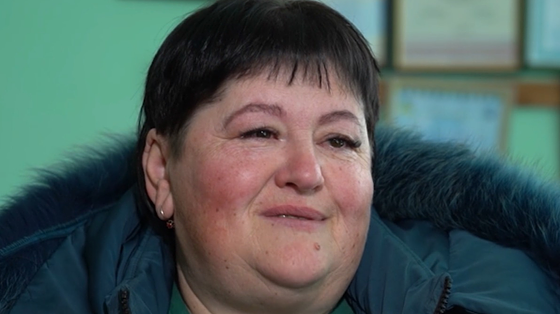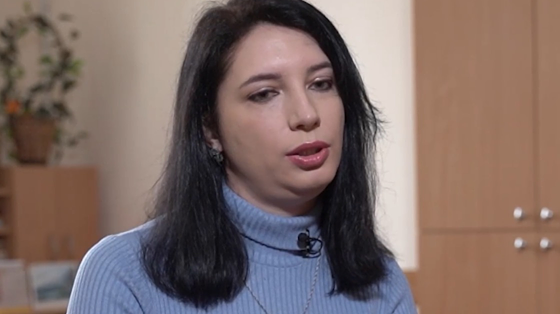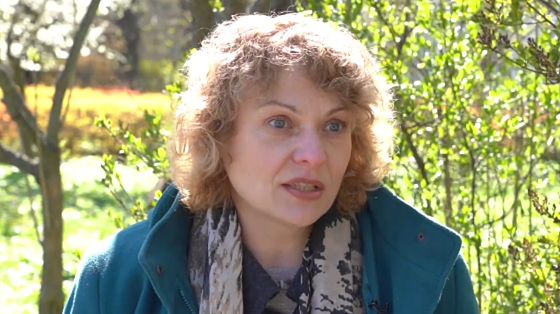Journalist Yevheniya Bobryk and her daughter tried to flee from Bucha twice. During their first evacuation attempt, their car was shot at from a grenade launcher. All their documents burned together with the car… This story is about weeks spent in the basement under shellfire, an express course on survival without water, electricity, telephone signal, and about crossing the border virtually without passports.
Lately, I have been all the time giving comments, recording interviews and answering questions about how we managed to escape.
Every time I recount those days, I start crying.
A friend advised me to re-tell all this a hundred times in order to stop crying. Perhaps, I have not reached this figure yet, but I feel like I am not really far from it.
My house in Bucha is located about eight kilometres from the airfield in Hostomel, so the war began just above my head. My husband had designed and built our house. He is an architect and designer. That is why our house is very elegant, light and glassy. It does not have a basement, but has large panoramic windows and wooden walls.
Nobody expected that there would be a need to hide from Russian mines and shells here.
So on 24 February, in the afternoon, we had to move to our friends who lived even closer to the airfield, but at least they had a basement in their house. We spent the first 14 days of the war there.
I cannot easily describe how the situation developed outside, in the town, because electricity disappeared almost immediately, as well as the telephone signal. There was a short episode when the Internet re-appeared, but there was no more electricity at that time and we could catch the signal only when we started up the power generator. Yet, this was very rarely, as we had little gasoline, and we also needed power to pump water and charge our phones, at least a little.
At first, we watched in horror some videos shot from the balconies of houses a kilometre away from us, which neighbours posted in chat rooms and social network groups of our streets. Those videos showed how “elite assault-landing troops” wandered amid our pines, like a flock of sheep, and although they did not look similar to the personages of “The Black Hawk” at all, it became clear that the war came close to us.
One day, a shell hit a house in the neighbouring residential compartment. That sound was louder than the others were.
Without power supply and heating, the house cooled down gradually. From 8 March, gas supply stopped. It was cold and dark, but at some point constant explosions even ceased to frighten us.
We used water and food sparingly. We tried to walk the dogs not far from the house. We read, cooked some food, played chess, and taught our kids the knit-work. We kept ourselves busy with anything in order not to think about what most likely awaited us ahead.
My daughter drew some portrait sketches of our basement’s tenants. If we could have taken all of them with us, I think it could be an interesting series “The first 14 days of the war in the basement in Bucha.
There was no mobile phone network, so in order to learn some news, we got in the cars and turned on the car radio. We did not know exactly what was happening in the town. But we had a clear understanding: if we did not manage to leave, our death would be just a matter of time. We were twelve people in the basement. We also had five dogs, two cats and one parrot with us.
Just a few months ago I could recommend where better to park in the centre of Vienna and how to buy Prada shoes for a ridiculous price. While today I can advise how much water you can get if you melt a bucket of snow (spoiler: not much), when to start digging a pit in the lawn to use it instead of a toilet; when you don’t have water at home (from the first day) what to cook in order to have a lot of food that does not perish for a long time without the fridge (soup), and how to wash a saucepan and dishes for 12 people using two litres of water (I cannot repeat it, but I know for sure that it is possible).
Occasionally we received some news: somebody managed to escape, somebody’s car was riddled with bullets.
Finally, on 4 March, we made our first attempt to escape. Our cars were shot at. First, they were gunned at from assault rifles, and then my Jaguar was fired at from a grenade launcher. I hopped out of the car when the hood was already on fire. The girl in the passenger seat was injured. While my husband was pulling her out, away from the fire, her daughter and I were hiding behind the car.

Then, apparently while the Russians were reloading their weapons, we managed to run across the road and jump into my husband’s car. We even saved the Pomeranian Spitz dog.
We had to return to the basement for shelter. Fortunately, a neighbour, who was a former paramedic, saw us dragging the wounded and came to the rescue. He told us that the wounded had internal bleeding and a bullet in the abdomen.
The ambulance refused to come to us because all the streets were under gun fire from Russians and they did not care if it was an ambulance or a car with children on-board, which we later found out first-hand.
We managed to get through to our friend, who was a member of the territorial defence unit and the owner of the basement where we were hiding. Risking his own life, he took the wounded to the hospital in Irpin.
Later, the friend sent us a message that the town was under occupation and there was no way to leave. We had to stay still, not to leave the house and wait. There was no further contact with him.
Our second attempt to escape was when the first evacuation column was leaving Bucha. We drove to Kyiv for eight hours.
It was the worst eight hours of my life. The column of cars moved very slowly through the damaged town, past destroyed houses, gunned down cars with “children” signs, white bed sheets and red crosses on them.
I will never forget how I saw a dead man near a bicycle on the side of the road. The snow half-cover his body.
We drove through Russian checkpoints. At one of them, we were told to open the trunk of the car and my husband was asked to hold our dog, a 13-year-old giant schnauzer, who could hardly walk, “What if he bites me?” The dog was barely alive – he had developed pneumonia in the cold basement, but already recovered by then.
All this time, a friend of mine called me and kept saying, “Everything will be fine, you will get through, you will not be shot”. All our friends, relatives and acquaintances were worried about us and waited. I am sure that we survived only because they were waiting for us so much. They really begged this war to let us stay alive.
The worst thing all these days was waiting for death, understanding of its inevitability. And also the feeling of guilt for the fact that my daughter, a 15-year-old talented beauty, would die with me. She kept saying that she did not blame me of not leaving with her earlier, of not sending her away when it was still possible, when my friends from abroad begged me to do so. She said, “Mum, you did everything right, we are together, and I am not scared.” But I knew that was not so.

It was this particular feeling that pushed me out of the basement on 9 March, made me get back in the car and try to save us all.
Having lost all our documents, all our belongings and almost all our nerves, my daughter and I came to the border with Poland, carrying a package of dog food, a bottle of water, an old laptop, two books (“The Picture of Dorian Gray” and “The Hobbit”), two dogs, and English textbooks.
When asked by a Polish border guard officer to show her at least some document, my daughter and I showed a low-quality photo of our passports on the phone and told her the story of how we lost them. First, she asked a colleague “what is a grenade launcher?” Then she asked where I was when this grenade launcher hit my car. Then she silently opened the turnstile for us.
Now we are in Poland, and we are safe.







.png)



